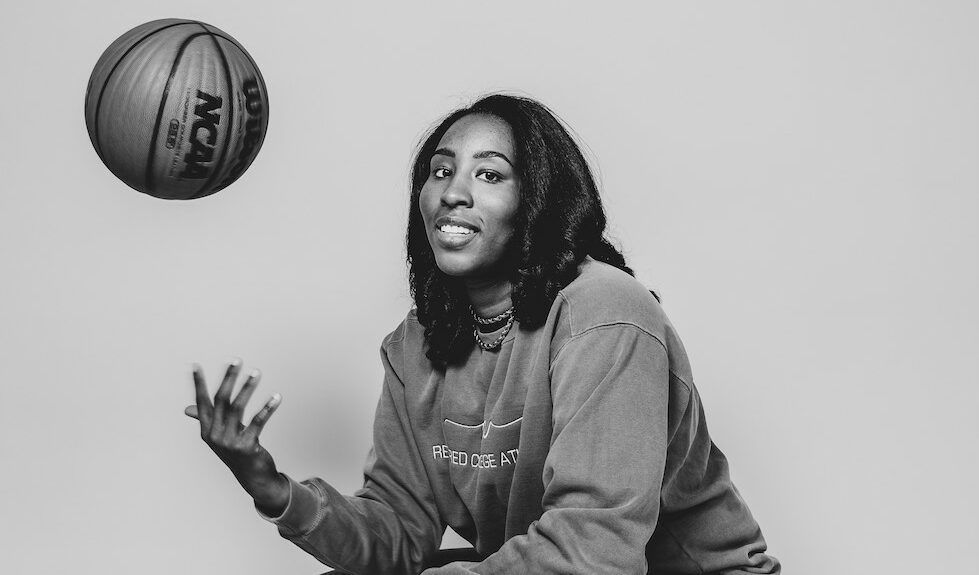
Today we’d like to introduce you to Sydney Umeri.
Hi Sydney, we’d love for you to start by introducing yourself.
I first started playing basketball when I was seven, and I was horrible. But I knew that I wanted to get better, and that was the most important thing to me. The opportunity to see myself progress and improve, to be bad one day and then to be better the next, was addicting. And so, from seven to about the age of 12, I had improved drastically and had also gotten into an awesome AAU program in the Atlanta area called Peak Performance that had changed my game significantly. I went from being terrible to ranked number one in the country amongst some ranking sites for girls basketball. From there, that’s when a lot of things started to change. I had gotten my first scholarship offer in eighth grade, and was really excited about the opportunity to possibly go play at the collegiate level. That’s all I had really ever wanted.
Fast forward to senior year. I had committed to the University of Virginia and was really excited to start my athletic career there. Really just pursuing the dream that I had always had as a high school and younger athlete. I got to UVA and the first year was wonderful. I played a lot. I had a great social life. I was doing well in school. It was really everything I thought college would be. But between my freshman year and my sophomore year, I decided to stay at the university to work on my skills. I knew that if I stayed there and got better over the summer, I would be better for my team. And I did get better. But sophomore year is when a lot of adversity hit. It was my first introduction into the world of business in sport. And I think that’s what a lot of people don’t realize. College sports are a business. It was when I realized that sometimes the hard work that you put in is not going to be recognized. Sometimes the hard work that you put in will be pushed to the side and oftentimes, there isn’t always transparency and why that happens.
While all that was happening, I came to the conclusion that this season was not going to be my season to go out and be great despite the work I’d put in. Also, I was learning for the first time that I had my own mental health issues to sort out. I had always been a pretty anxious kid, but I didn’t know what performance anxiety was until I got to college. For the first time, I was being told that “Oh, you actually have performance anxiety. That is why you are so anxious when you play. Your fear of messing up, this perfectionism that you have, it’s actually detrimental to you.” For me, in the past it had always been who I was and not seen as an illness. So as I struggled to perform on the court, manage the feelings of not understanding why things weren’t working out, and work through a mental health issue of performance anxiety, things were really tough. Moving to my junior year, that’s when I realized that I actually just need to transfer. I needed to get out of the program because it wasn’t healthy for me. I was really tired of the gaslighting and the manipulation that was happening by my coaches, but that many college athletes have to deal with.
It was September of my junior year and I had a whole additional year until I would graduate, but I knew then I wanted to transfer. I had a conversation with my coach that confirmed this was not going to be a healthy place for me to stay, so I talked to my Dean and we came up with a plan to combine two years of college into one so that I could graduate, transfer, and play right away. I proceeded to take 18 credits in the fall, nine credits over Christmas break, and then 27 credits in the spring, which is the bulk of our season. It was extremely hard. But as I look back on that season in my life, it’s a lot of what has built me into the person I am today. There was a lot of adversity that happened. I had to put emotions to the side and just focus on the goal. But fortunately, I was able to gain all the credits I needed to graduate and transfer to another university, which was the University of Kansas.
At Kansas, I was trying to start new. I was under a much better coaching staff that was a lot more supportive and transparent. But the damage was done. I was a shell of myself in terms of an athlete and was just trying to end my career in a respectable way. Finally, my last year of eligibility came to an end. It was then that I realized, I cannot be the only person who has struggled like this through my college athletic career. That’s what inspired Retired College Athletes. It’s inspired by the idea to give former college athletes a platform to discuss their collegiate career, all while informing the next generation of college athletes about what their experience could look like so that they’re better prepared.
We all face challenges, but looking back would you describe it as a relatively smooth road?
No, it has not been a smooth road at all. I think not having a good understanding of my mental health early on was probably the first speed bump that I experienced. The next one was getting to college and not being fully prepared for college athletics. To be honest, no one could be fully prepared no matter how much advice you get from other people, but just not really understanding that college athletics is a business is the thing that set me back.
Outside of that, being under leadership that wasn’t transparent was really hard, specifically as a young adult, an 17 to 21 year old, who was working with coaches who I believed would have my best interest in mind and then ultimately showed that they did not. And then ultimately, the hardest thing I went through was trying to graduate early, shoving two years into one with just a bunch of credits. Eighteen credits in the fall, nine credits over Christmas, and 27 credits in the bulk of our season in the spring was extremely hard. I don’t know too many who have taken that many credits and been able to do that while playing a sport.
Despite all the road bumps, it has led me to create this awesome platform that a lot of former college athletes, current athletes, and parents appreciate. Being able to provide value to a group of people who want to feel seen and heard is so rewarding.
Thanks for sharing that. So, maybe next you can tell us a bit more about your work?
I am the founder of Retired College Athletes, a platform designed to inspire and inform current and former college athletes through stories and advice from retired college athletes. We focus on athlete and retired athlete mental health, how to make the transition out of college sports a positive one, bring awareness to the abuse and mistreatment that happens in college athletics, and ultimately provide support and resources to those athletes.
Is there something surprising that you feel even people who know you might not know about?
Despite how much I’m an advocate for athlete mental health and getting the help you need, when it was time for me to decide to seek help, I didn’t want to. I had to fight with myself to do it, but now, looking back, it’s one of the best decisions I’ve made and I hope everyone who needs help makes that decision for themselves as well.
Contact Info:
- Email: sydney@retiredcollegeathletes.com
- Website: https://www.retiredcollegeathletes.com
- Instagram: https://www.instagram.com/retiredcollegeathletes/
- Youtube: https://www.youtube.com/channel/UCKZ4wS3BmRmm9xn7Tn4fecw
- Other: https://www.buzzsprout.com/1274186





















